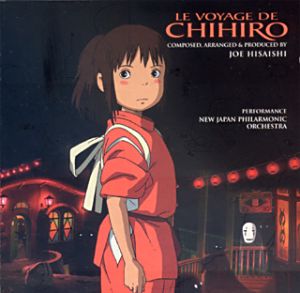************************************************************** EDITOR’s CHOICE January 2003 **************************************************************
Le Voyage de Chihiro
Music composed by Joe Hisaishi
Lyrics for 'Itsumo Nando-demo' by Wakako Kaku
'Itsumo Nando-demo' performed by Youmi Kimura
New Japanese Philharmonic Orchestra
Available on Milan (93926-2)
Running Time: 60:02
Crotchet Amazon UK Amazon US

Le Voyage de Chihiro, also known as Spirited Away, is the perfect example of why not to judge a CD by its cover; behind the uninspiring artwork lies the soundtrack album of the year. Not being a fan of feature animation I have come to this party rather late, despite friends with good taste repeatedly enjoining me to discover the work of Japanese filmmaker Hayao Miyazaki by purchasing a DVD of Princess Monoko now! I am beginning to understand something of their enthusiasm, for the music in Le Voyage de Chihiro is the result of just the latest film in a long lasting collaboration between composer Joe Hisaishi and Miyazaki. And if Miyazaki films, of which Princess Monoko is the most celebrated, are half as good as this album, they must be very fine. Much of this CD is simply stunning; I have not been so excited by a soundtrack by a composer previously unknown to me since discovering Christopher Gordon's On the Beach.
Spread over 21 tracks and almost exactly one hour's playing time is music of sufficient quality to confound every prejudice one may ever have held against anime. Here there is no crass techno-rock or clichéd synthesiser meandering. Rather, this is the Japanese equivalent of the thrilling symphonic blockbuster scores of John Williams and Jerry Goldsmith, shot through with wonderful melodic inventiveness and set-pieces of such delicate wonder and exhilarating, thrilling quality they send shivers down the spine and make one press replay the moment the disc has ended. This is the sort of work which attracted many film music aficionados to the form in the first place.
The opening, 'One Summer's Day…' introduces the score with a delicate, distant piano melody. The theme is at once dreamlike, romantic and infectious, a glorious melody which runs through the score in a way strangely comparable with Elmer Bernstein's use of piano in this month's Far From Heaven. Soon however the opening explodes into a dynamic and muscular orchestral fireworks display, setting the scene for many surprises to come.
'A Road to Somewhere' floats in atmospheric gossamer fantasy, the piano almost jazzy in its exploratory, improvisatory questionings. 'The Empty Restaurant' offers vigorous writing for strings, harp and percussion, venturing into territory chartedl by John Williams in the early sequences of Close Encounters of the Third Kind. 'Nighttime Homecoming' becomes a brief but powerful scherzo, setting-up the grandeur of 'The Dragon Boy', the first unmistakably oriental cue on the album. Filled with dramatically urgent strings and noble horns, the piece introduces what may be thought of as a 'fate' or 'destiny' theme to great effect.
'Sootballs' is a playful scherzo-come-waltz with some beguiling piano writing and a descending motif which incidentally calls to mind Leonard Rosenman's fine score for the original film version of The Lord of the Rings. It is with 'Procession of the Gods' that the album really reveals itself to be something truly special, for here is a rousing, utterly joyful march filled with the most dazzlingly inventive orchestrations from oriental percussion to wordless voices.
So the album unfolds, from the magically glittering textures of 'Yubaba' through the deliriously eccentric march for 'The Stink God' to the mournful, elegiac 'The Sixth Station'. The three final cues bear especial mention. 'Reprise…' is a slowly building fantasy waltz for piano and orchestra, which may evoke memories of Miklós Rózsa's fabulous 'Time Machine Waltz' from The After Time, but is an equally beguiling creation in its own right; building to one of the most heart-warmingly glorious climaxes in all modern film music, fading away in a sea of chimes and slight ghosts of Sakatomo's Merry Christmas Mr Lawrence, then rising once more to a peak of cinematic wonder. 'The Return' opens with a blaze of triumphal glory then transforms into a deliciously lyrical landscape again dominated by piano. The final track, 'Itsumo Nando-demo' ('Always With Me') performed by Youmi Kimura, is a song, but far from Hollywooden caterwauling, it is imaginative and delicate, a folk-like piece entirely in-keeping with the score which precedes it.
If you only buy one CD this year, ignore the temptation of the big and well established names. Le Voyage de Chihiro is the disc for anyone who wants to experience a comparable thrill to the first time they heard the very best albums of John Williams or any of the other Hollywood greats. Yes, it really is that good.
Gary Dalkin
5
Return to Index